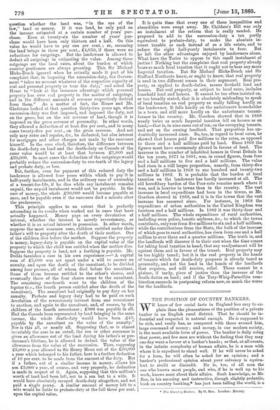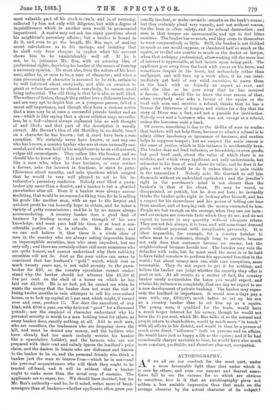THE POSITION OF COUNTRY BANKERS.
WE know of few social facts in England less easy to explain than the pleasantness of the position of a private banker in an English rural district. That he should be influential and respected is natural enough. He is supposed to be rich, and really has, as compared with those around him, large command of money ; and money, in our modern society, is the most available form of power. The banker is daily using that power, and few men are without the feeling that they may one day want a favour at a banker's hands ; or that, at all events, in the infinite complexity of human affairs, he is a man with whom it is expedient to stand well. If he will never be asked for a loan, he will often be asked for an opinion ; and a banker's professional opinion about your solvency is equivalent to credit or discredit. He is, too, of all men the one who knows most people, and who, if he is well up to his work, knows most about their affairs. Such knowledge, as Mr. Rae, in his amusing and instructive, though slightly pedantic, book on country banking,* has just been telling the world, is a most valuable part of his stock-in trade, and is, of necessity, collected Ly him not only with diligence, but with a degree of inquisitiveness which in another man would be pronounced impertinent. A squire may not ask too many questions about his neighbour's pecuniary affairs ; but a banker is bound to do it, and even to go the length, Mr. Rae says, of making secret calculations as to his savings, and insisting that he shall only draw cheques in cypher when his account shows him to be unmistakeably well off. If he is not, he is, intimates Mr. Rae, with an amusing idea of professional rights, depriving his banker of the means of forming a necessary opinion. He must also, from the nature of his business, either be, or seem to be, a man of character; and when a man presumably of character is assumed to be rich, certain to be well informed about everybody, and able on occasion to grant or refuse favours to almost everybody, he cannot avoid being influential. The odd thing is that he is also so well liked. The writers of fiction, though they rather love a dishonest banker, and are very apt to depict him as a pompous person, full of a secret self-importance, and though they have a curious notion that a man may be at once a successful private banker and an ass—which is like saying that a clever solicitor may, nevertheless, be a fool—almost always represent him as well thought of and liked; and that part of the description is usually correct. Mr. Besant's idea of old Mortiboy is, uo doubt, based on a character he has known ; but it must have been a rare exception. We certainly never have known, or met any one who has known, a country banker who was at once unusually successful, and who was held by his neighbours to be an evil-natured, vulgar old curmudgeon. They rather like the banker, and we should like to know why. It is not the usual nature of men to like a man who, when he does business, or even confers a favour, asks for interest in fractions, is strict to punctiliousness about security, and asks questions which suggest that he would be very well pleased to act as his interlocutor's pecuniary confessor. Nobody ever liked a pawnbroker any more than a dentist, and a banker is but a glorified pawnbroker after all. Even if a banker were always accommodating, that would be no reason for liking him, for he is selling his goods like another man, with an eye to the largest and quickest profit he can honestly hope to obtain, and he takes a variety of petty commissions ; and he is by no means always accommodating. A country banker does a good deal of business by lending money on the strength of his own knowledge, and must pass half his time, or at least a considerable portion of it, in refusals. Mr. Rae says, and we can well believe it, that there is a whole class of men in the country who are always asking impossible loans on imperceptible securities, men who seem impudent, but are only silly; and there are certainly others still more numerous who are quite honest, and cannot understand why their rubbishy securities will not do. Just as the poor widow can never be convinced that her husband's "gold " watch, which cost so much twenty years ago, is not valid security to the pawnbroker for £20, so the country speculator cannot understand why the banker should not advance him £1,500 at five per cent. on the shell of a house on which he has laid out £2,000. He is no fool, yet he cannot see when he wants the money that the banker does not want the risk of losing twelve months in vain attempts to sell his over-valued house, or to lock up capital at 5 per cent. which might, if turned over and over, produce 15. Nor does the annuitant of any kind, with £500 a year, see why he is not "good" for a thousand pounds ; nor the employ of character understand why his personal security is worth to a man holding trust for others, as every banker does, exactly nothing at all. Add to such men, who are countless, the tradesmen who are dropping down the hill, and must be denied any money, and the builders who have already had too much (nobody worries his banker like a speculative builder), and the farmers who are not prepared with their rent and calmly ignore the landlord's prior claim, and the dealers in beasts who are dishonest and known to the banker to be so, and the personal friends who think a banker just the man to borrow from—which he is not—and the personal acquaintances who will think they ought to be trusted off-hand, and it will be evident that a banker ought to make more than the usual crop of enemies. The applicants are so eager, too. We should have doubted, but for Mr. Rae's authority—and he, be it noted, writes more of bankmanagers than of bankers—whether applicants often grow per
sonally insolent, or make sarcastic remarks on the bank's means ; but they certainly plead very warmly, and not without reason, for the loan is often safety, and its refusal destruction ; and men in that temper are unreasonable, and apt to feel bitter enmities. The banker has so much, and they seem to themselves to want comparatively so little. Still, the banker is not disliked as much as one would suppose, or slandered half so much as the squire, or reviled one quarter so much as the doctor or lawyer, when that unhappy professional, afteriwaiting till the mere loss of interest is appreciable, at last insists upon being paid. The applicant goes away from the bank with sweat on his brow, and sometimes despair in his heart, but melancholy rather than malignant, and will turn up a week after, if he can intermediately get hold of any valid securities, to pawn them at the bank with as friendly an aspect as ever, and with the idea as he goes away that he has received a favour. We should like to know the true reason of that, when everybody who asks a favour of the squire or the local rich man and receives a refusal, thinks that ho has a license for bitterness of tongue, and wishes for a day that the story of Dives was a fact, and not a parable for instruction. Nobody ever met a borrower who was not savage at a refusal, unless the borrowee were a bank.
Of course, something is due to the dislike of men to confess that bankers will not help them, because to admit a refusal is to admit either insolvency or ignorance of business, and caution helps to suppress temper ; but we suspect the main reason is the sense of justice, which in this instance is accidentally keen. The banker does not lend influence, or friendship, or even goods, but good hard cash, about the value of which there is no mistake, and which every applicant not only understands, but estimates in his time of need above its value, and he does it for gain ; and why should ho do it unless there is gain visible in the transaction P Nobody asks Mr. Garrard to sell him diamonds without an undoubted equivalent ; and the jeweller's right in the purchaser's mind is not clearer than the banker's in that of his client. Ho may be vexed, or disappointed, or pettish, but he does not hate ; he inwardly thinks the banker quite right in looking after himself, and has a respect for his shrewdness and his power of telling one loan from another, and of keeping safe the money entrusted to him. People are fair enough on the average, when they can see facts ; and sovereigns are concrete facts which they do see, and do not expect to receive in any quantity without adequate return. They are not fair always, it is true, and will sometimes demand goods without payment with inexplicable perversity. It is often impossible, for example, for a country butcher to refuse meat to a customer, though long in arrears, because not only does that customer become an enemy, but the neighbourhood becomes hostile too. The butcher may ruin the defaulter with suits, but be must send the meat in or be held to have failed somehow to perform his appointed function in the world ; but about money men are, with rare exceptions, more reasonable. They do not expect to get it for nothing, and believe the banker can judge whether the security they offer is good or not. At all events, as a matter of fact, the country banker rarely accumulates the hates you would expect, and retains his influence so completely, that one day we expect to see a new development of private banking. The banker may supersede the landlord in importance. It would now-a-days pay a man with, say, £100,000, much better to set up his son as a country banker than to set him up as a squire. The young man, if qualified for the trade, world have a much larger interest for his money, though ho would not have the 15 per cent. which Mr. Rae talks of as the normal and proper return to shareholders, would le much more "in touch" with all affairs in his district, and would in time be a person of much more direct "influence" both on persons and on affairs. He would have just as happy a life as the squire ; and if he had occasionally sharper anxieties to bear, he would have also much more constant, profitable, and therefore pleasant, occupation.



































 Previous page
Previous page